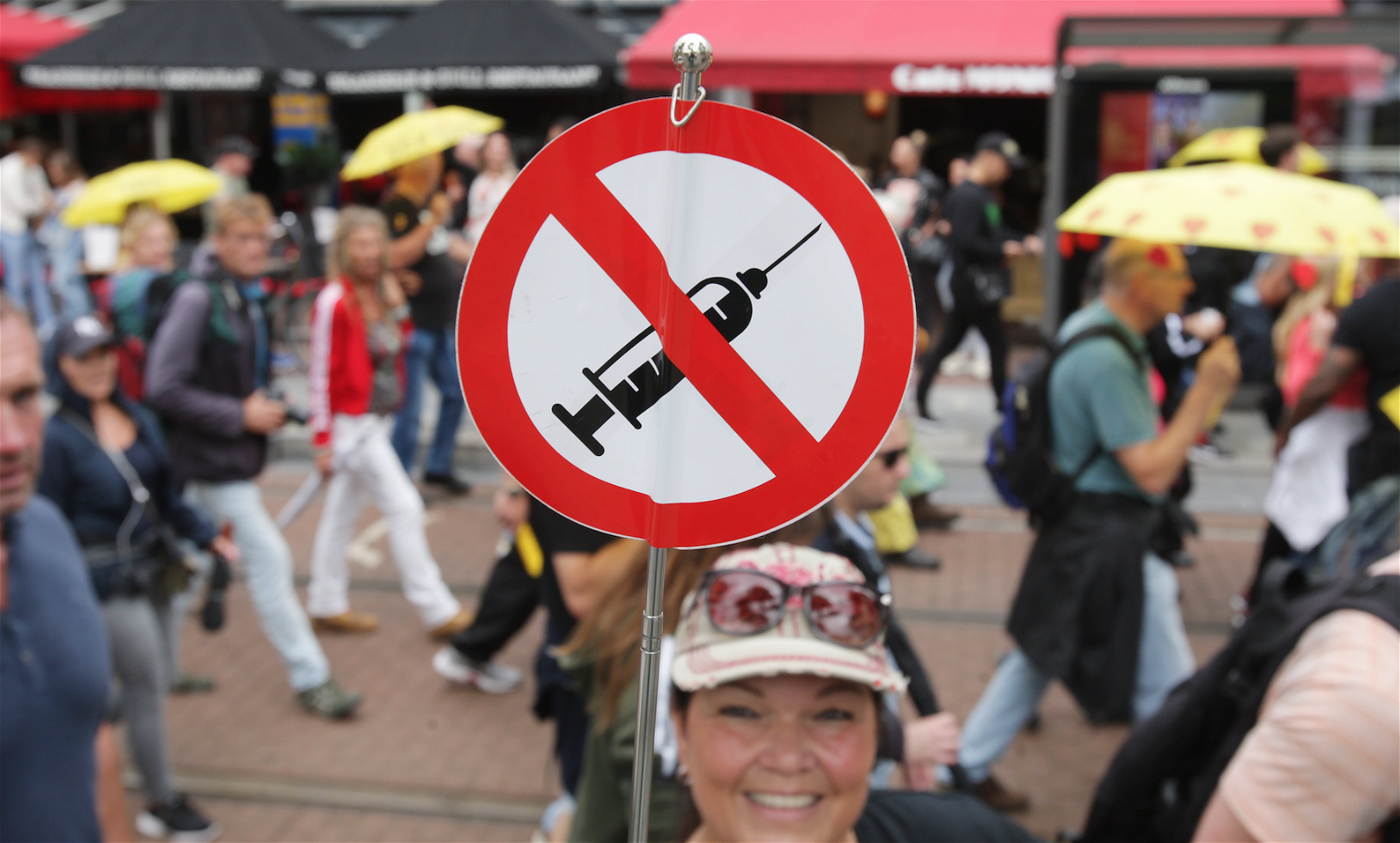They are quite fanatical, most of the vaccine refusers. Research has already shown that most of those antivaxxers are also barely amenable to scientific arguments that refute their position. But even as we enter the final phase of the vaccination campaign, this statement still stands: it is important for herd immunity that enough people get vaccinated. So here are ten answers to ten arguments vaccine rejecters like to make. You never know.
1: The Covid-19 vaccine affects a woman’s fertility and/or is dangerous for those who are pregnant
That last myth was fueled when in December 2020 a message on social media was shared by Dr. Wolfgang Wodarg, a physician and former chief scientist for allergy and respiratory therapy at Pfizer, and Dr. Michael Yeadon, a pulmonologist. They claimed that the spike protein on the coronavirus was the same as the spike protein responsible for the growth and attachment of the placenta during pregnancy. The fear was that as a result of the vaccine, the immune system would be unable to distinguish between the two spike proteins and attack the placenta protein.
This is not true. The overall composition of the placenta protein is very different from the coronavirus spike protein.
In addition, the benefits of vaccination outweigh the risks of infection for pregnant women. Because what is true although the overall risk of serious illness is low, pregnant and recently pregnant people are at increased risk of serious illness from Covid-19 compared to non-pregnant people. In addition, pregnant women with Covid-19 are at increased risk of preterm birth and may be at increased risk of other adverse pregnancy outcomes compared to pregnant women without Covid-19.
That the vaccines would make women less fertile is not true either. This has indeed been tested, first in the first research phases on animals, and then proved by the number of pregnancies that arose during the test phases with humans.
2: Vaccine May Cause Male Infertility and Erectile Dysfunction
One of the main reasons for men not to get vaccinated is the idea that vaccines can affect male fertility and potency. Research shows the opposite. There is no evidence that the vaccine harms a man’s reproductive system. But Covid-19 does.
Recent studies by doctors and researchers have discovered potentially far-reaching consequences of coronavirus infections for men of all ages, including younger and middle-aged men who want children.
That in itself is no surprise. After all, scientists know that other viruses invade the testicles and affect sperm production and fertility. Case in point: Researchers studying testes from six patients who died of the 2006 SARS-CoV virus found that they all had widespread cell destruction, with little to no sperm.
Mumps and Zika viruses are also known to invade the testicles and cause inflammation. Up to 20 percent of men infected with these viruses will have reduced sperm production.
3: I’ve had Covid-19 so I don’t need a vaccine
Reinfection with SARS-CoV-2, the virus that causes Covid-19, can even occur in individuals who have contracted the virus before. But the vaccine does protect against serious Covid-19 complications for those who become reinfected.
The level of protection achieved by natural immunity after infection with the virus is unknown. But scientists believe that the vaccine offers better protection than a natural infection.
Immunity comes from the immune system’s ability to remember an infection. Using this immune memory, the body manages to fight back if it encounters the disease again. Antibodies are proteins that can bind to a virus and prevent infection. T cells are cells that direct the removal of infected cells and viruses already bound by antibodies. These two are some of the key players that contribute to immunity.
After SARS-CoV-2 infection, a person’s antibody and T-cell responses may be strong enough to protect against reinfection. Research shows that 91 percent of people who develop antibodies to the coronavirus are unlikely to become reinfected even after a mild infection for six months. People who had no symptoms during the infection are also likely to develop immunity, although they tend to make fewer antibodies than those who felt sick.
The problem is that not everyone will develop immunity after a SARS-CoV-2 infection. As many as 9 percent of infected people have no detectable antibodies, and up to 7 percent of people do not have T cells that recognize the virus 30 days after infection.
For people who do develop immunity because they became infected, the strength and duration of protection can vary widely. At least 5 percent of people will lose their immune protection within a few months. Without strong defenses, these people are susceptible to re-infection by the coronavirus. Some have had a second bout of Covid-19 as early as a month after their first infection; and, while rare, some people who contracted a second infection have been hospitalized or even died.
Covid-19 vaccines generate both antibody and T-cell responses, but they are much stronger and more consistent than natural infection immunity. Studies also show that antibody levels are much higher in vaccinated people than in those who have recovered from infection.
4: Side Effects of the Covid-19 Vaccine Are Dangerous
Most side effects of the COVID-19 vaccines are very mild: low-grade fever, aching arm and fatigue. And that takes one to a maximum of three days. Rare side effects such as blood clots are very rare. Per one million people who received a first injection, there were 8.1 reports of thrombosis with thrombocytopenia syndrome (TTS) – blood clots with low platelets. That’s according to a study that looked at a total of 49.23 million people who had received the AstraZeneca vaccine in the EU, the European Economic Area and the United Kingdom. After the second dose, there were 2.3 cases per million reporting blood clotting problems. The figures are similar for Janssen’s vaccine.
Incidentally, the risks of blood clots in unvaccinated people as a result of a Covid-19 infection are eight to ten times greater.
5: Vaccines have a microchip that can track and control a person
This conspiracy theory has been propagated by anti-vaxxers who believe that American business magnate, investor and philanthropist Bill Gates will implant microchips to track people’s movements, using the vaccine as the delivery method.
This myth gained traction when a video was shared on Facebook making false claims about the optional microchip on the syringe label of the Covid-19 vaccine. The purpose of this microchip is to confirm that the injectable and vaccine are not adulterated and have not expired. The chip also confirms whether the injection has been used. The microchip is part of the syringe label and not the injectable itself.
6: The development of the Covid-19 vaccine went too fast
It is true that the vaccine against the coronavirus has been developed very quickly. But that was possible because vaccine technology had been in development for many years. Once the SARS-CoV-2 genetic information was identified, the process could begin quickly. There were ample resources to fund the study, and social media made it easier to recruit participants for the clinical trials.
Because Covid-19 is so contagious and widespread, it didn’t take long to see if the vaccine worked for the research volunteers who were vaccinated. Companies started producing vaccines early in the process — even before their approval — so some stocks were ready when the authorization happened.
7: The Covid-19 vaccine could change my DNA
The messenger RNA vaccine (Pfizer, Moderna) and the viral vector vaccine (AstraZeneca, Johnson & Johnson) cause your body to develop protection so that when you are infected with SARS-CoV-2, your body is prepared to fight the virus . The messenger RNA (mRNA) from two of the first types of Covid-19 vaccines does enter the cells, but not the nucleus of the cells where the DNA is located. The mRNA causes the cell to make proteins to boost the immune system, and then it breaks down quickly — without affecting your DNA.
8: We don’t know what the long-term side effects are
Any adverse side effects from vaccines almost always occur within the first two weeks, and certainly in the first two months, experts say. The most serious side effects of vaccines in history have all been noticed within six weeks. That’s why health authorities in Europe and the US, for example, have waited at least two months after the subjects were vaccinated before considering whether to give emergency approval for Covid-19 vaccines.
9: My faith will protect me, so I don’t need to be vaccinated
Unsurprisingly, some religious communities have expressed doubts about the vaccine. A study from 2019 found that religion and vaccine refusal are related. One study in Australia this year found that people with “higher levels of religiosity” were more likely to be hesitant or resistant to their intention to get vaccinated. Religious skepticism has been around since the invention of vaccines in the West in 1796, when some religious leaders viewed the smallpox vaccine as “acting against God’s will.”
Today there are remnants of that anti-scientific argument. Here’s the counter-argument: If you believe that God created us in his image, including the ability to think and reason, vaccinations have saved us a lot of sickness and misery. think away. We’re not going to die of smallpox anymore. Children are no longer permanently paralyzed by polio. That’s a good thing. That’s because God has given us a brain to think and reason with. So let’s use it.
10: There are more of us vaccine rejecters than you think
Not really. When the vaccination campaign against the coronavirus is over – or at least this round of it – barely 100,000 Flemish people over the age of 18 are expected to have deliberately refused a shot. Not bad at 5.3 million. We’re doing a lot better in that area than most regions in the world. And while images of vaccine protests may seem spectacular, across Europe they are nothing more than a rearguard action rather than a veritable uprising. Even in France, where the protests are at their worst, three quarters of the population have no problem introducing the famous health pass which restricts access to, among other things, restaurants to those who have been vaccinated.
PS: People who have been brainwashed into thinking vaccines are bad are not the real problem.
The real problem is the people doing the brainwashing. Quite a few of them have been vaccinated themselves. They just sow doubt and fear out of self-interest. After all, who cares about the truth when polarization can be so profitable?
(am)
Also read:
–


